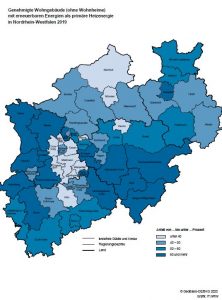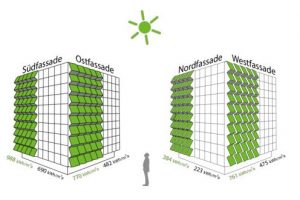On 22.12.2020, the Senate passed the first legal ordinance on the Hamburg Climate Protection Act. This regulates the concrete implementation of the solar roof obligation and the integration of renewable energies when replacing heating systems. With these regulations, Hamburg is one of the pioneers in climate protection in the building sector nationwide.
Together with the Climate Protection Act, the Climate Plan was adopted. This comprises more than 400 individual measures and is one of the city's most important climate and economic stimulus projects. The Climate Protection Act provides, among other things, for an obligation to install photovoltaic systems on the roofs of new buildings in Hamburg from 2023. For existing buildings, where the roof cladding is completely renewed, the obligation will take effect from 2025. From mid-2021, a minimum proportion of the heating energy requirement must be covered by renewable energies when the heating system is replaced. The details and exemptions to the new requirements are set out in the legal ordinance that has just been issued. . BUKEA estimates the potential savings from the photovoltaic obligation at 60,000 tons of CO2 by 2030.
The principle of economic efficiency also applies to the roofs: solar energy should pay for itself, for which the environmental authority bases an amortisation period of 20 years for photovoltaic systems. If, in individual cases, the payback period should be longer, the obligation does not apply. However, the environmental authority assumes that many systems will pay for themselves in a much shorter period and will also run for longer than 20 years. Exceptions are provided for in individual cases where the installation of a photovoltaic system is technically impossible or competes with other unavoidable uses.
A minimum size for the photovoltaic system was not specified, so that the obligated parties can choose a system that corresponds to their economic interests and allows a coexistence with other roof uses, such as the combination with a green roof.
Jens KerstanSenator for the Environment, Climate, Energy and Agriculture: "The EU, the federal government and also Hamburg must make great efforts to achieve the climate targets from the Paris Agreement. The public sector is just as much in demand here as industry, commerce and private individuals. We can and must all make a significant contribution to buildings through renewable electricity and climate-friendly heating. Especially in densely built-up urban areas, it is important to use suitable areas, preferably several times.
Hamburg's roofs offer enormous potential for the expansion of solar energy. The technology is mature, proven and has become increasingly economical and efficient over the past 20 years. It is now standard practice in more ambitious building projects. With the Climate Protection Act we have introduced the obligation that the solar energy potential on the roofs of our city is used. In the future, at least 15 percent of the heat for buildings must be produced from renewable energies when heating is replaced - with the legal ordinance passed by the Senate today, we are defining the content of the legal criteria.
With the support of renowned experts, we now have a legal regulation with a sense of proportion and comprehensible criteria for the evaluation of exceptions. It is now a matter of implementing these with all those involved. The city's skilled trades will play an important role in this. With regard to the minimum share of 15 percent renewable energies in new heating systems, we are relying on reliable and proven technologies such as the use of biomass, solar thermal energy and environmental heat, but also on technical innovations such as fuel cell technology in the future.
Wherever there is the possibility of connecting to a heating network that can supply heat with a corresponding share of renewable energies, this simple option can and should also be used. The expansion of heating networks and heat production with more renewable energies is another important component of the heat transition in Hamburg. With a view to the financial implications for owners and tenants in this city, we link the obligation to the economic viability of the measures. The use of more renewable energies should also prevent the costs of electricity and heating in Hamburg from rising in the long term. The housing industry can make so-called tenant electricity offers to its tenants and thus allow tenants to participate in the energy transition. This is already expressly permitted by the Climate Protection Act, and the conditions for tenant electricity models have just been considerably improved in the Renewable Energies Act (EEG) of the Federal Government. With these regulations, Hamburg is one of the pioneers in climate protection nationwide."
Dr. Veit Bürger, Deputy Head of the Energy & Climate Protection Division (Freiburg) at the Öko-Institut advised the environmental authority on the drafting of the ordinance and explains: "The obligation to use renewable energies is an important step for Hamburg's climate protection. The heat turnaround will only succeed if more renewable heat energies are used in existing buildings. Our calculations show that for each of the building types examined, there are different variants with which a homeowner can meet the new obligation in an economical way."
Gerhard Stryi-Hipp, Head of the Smart Cities Group at the Fraunhofer Institute for Solar Energy Systems in Freiburg and also an expert for the legal ordinance, says of Hamburg's photovoltaic obligation: "With the PV obligation designed in this way, Hamburg has created a well-founded set of regulations that stimulates the necessary expansion of solar energy without overburdening the obligated parties."
In view of the economic and cyclical consequences of the Corona pandemic, an increased expansion of solar systems and renewable heat systems offers a great opportunity to strengthen the local and regional economy and value creation, while at the same time advancing the energy transition even faster. This applies to the entire value chain, from planning to installation by craftsmen and women. Every new building and every building renovation offers an opportunity for the economy and for climate protection. The environmental authority will support the implementation of the new obligations with accompanying information materials and advisory services.
Info on the net:
Background information on the climate protection law: www.hamburg.de/klimaschutzgesetz
Legal ordinance on the Climate Protection Act: t.hh.en/14762816
Hamburg Climate Protection Act (HmbKliSchG)
Source: PM of the City of Hamburg from 22 December 2020
Keywords:
DE-News, Renewable, Climate protection, Communities, News Blog Hamburg, PV, Transition Town, Environmental policy, Housing





